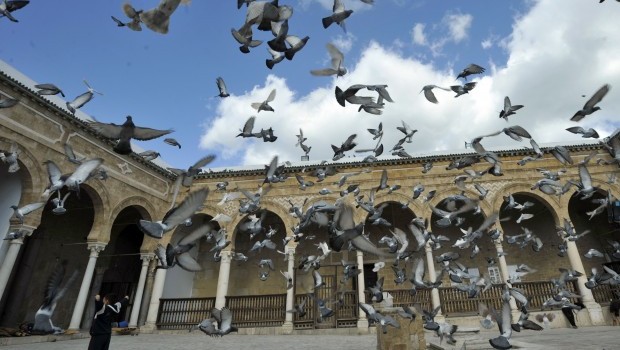
The historic Zituna mosque in the heart of Tunis’ old quarter. Two years after the Arab Spring uprisings, Tunisia is trying to win back holidaymakers in a lifeblood sector for the North African country which is gripped by renewed political crisis. (AFP PHOTO / FETHI BELAID)
The latest statistics published by the National Office of Tunisian Tourism show a decline of 4.2 percent in revenue for the first quarter of 2013, compared with the same period from the previous year. Sources in the information office of the Tunisian tourism department said that the number of tourists coming to the country had in turn decreased by 5 percent.
Overall, the number of tourists was 1,053,424, but more than half of this number came from Libya, according to statistics prepared by the tourism office. Income from tourism was estimated to be TND 491 million (roughly EUR 237 million) over the same period.
Hadi Al-Hamdi, director of media and tourism studies at Tunis University, told Asharq Al-Awsat that fears persist that the French tourism market, which declined dramatically in step with outbreaks of political and economic instability in Tunisia, will not recover to its previous levels.
He added that the Russian market presented fresh opportunities, and that there was the possibility of recovering some potential from the English and German markets.
Nevertheless, he said that any further security scares, such as more political assassinations or outbreaks of violence in important tourist areas like Nabeul, Hamamat, Susa, or Jarba, could have disastrous consequences for the Tunisian tourism industry.
Mohamed Sayim, a tourism official in the Tozeur region, an important desert attraction, told Asharq Al-Awsat via telephone that substantial numbers of bookings from foreign tourism markets had been cancelled last March, especially those from France, Belgium and Canada. This was after an increase of security worries, and the assassination of the political leader Shokri Bel`aid. He noted that complete cancelations made the situation even less clear regarding tourism estimates for the peak season.
The agent did not hide his concerns over the impact that tourist activities would have on the social atmosphere in the hotel complexes; especially after it became known that there had been a relative improvement in the sector over the past year. Sayim expressed that, despite these difficulties, those who work in the sector are confident that there will be a return to former levels of tourism as soon as social and security situations become more stable.
The Ministry of Tourism has launched several different promotional campaigns in different foreign markets to boost tourism in Tunisia, which will continue throughout April and May. The ministry’s chief aim is to restore the image of Tunisia as a safe and hospitable destination, in contrast to media reports of anarchy and instability.
The storming of the US embassy in Tunis on September 14 2012, and the assassination of the leftist activist Shokri Bel`aid on February 6 2013, raised serious questions about the social and political stability of the country, compared with similar tourist destinations. The failure to resolve issues of conflict with hardline religious currents, particularly the Salafist movement, has also been blamed for damaging Tunisia’s image abroad.
As a result, news reports of attacks on police stations and security forces continue to have a direct and negative effect on numbers of bookings, despite the fact that these events are often taking place months before the actual visit to the country are scheduled. For example, a group of 150 religious extremists recently attacked a national security center in Hergla, near the tourist city of Sousse, on the evening of Thursday April 12.
Although official statistics point to a modest recovery in the fortunes of the Tunisia tourism industry, the latest figures emphasize that this has been insufficient to return to its old levels levels. In 2012, Tunisian tourism revenues rose by 30 percent compared with 2011, but they remained 10 percent lower than those recorded in 2010.
Overall, this has worsened Tunisia’s already serious unemployment problems. Habib Ammar, the director general of the National Office of Tunisian Tourism, told the Tunisian state news agency that the crisis of the tourism sector had led to the closure of 17 hotel complexes, which involved 3,000 direct employees losing their jobs, as well as 20,000 seasonal jobs being “abandoned.”
This has in turn affected the wider economy, economist Saad Bomakhlah told Asharq Al-Awsat. He added that its negative impacted extended to many other areas, such as air transport, travel agencies, industry, traditional industries, and other services, and emphasized that these areas also needed serious attention.
